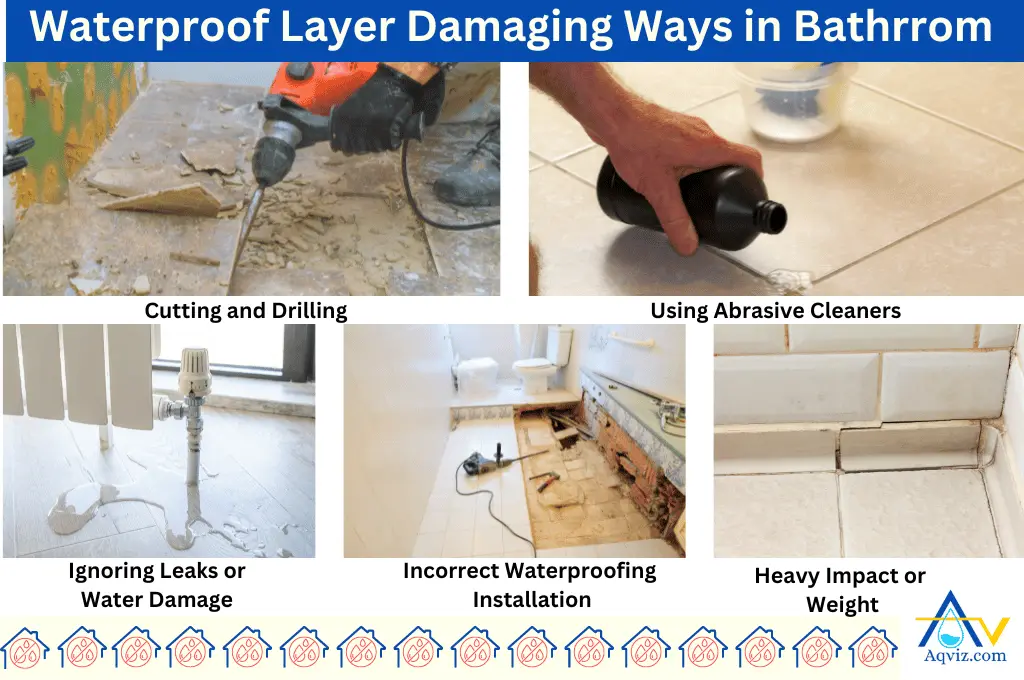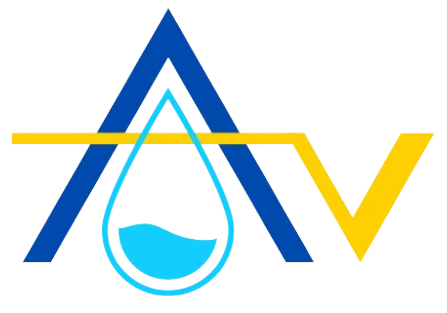What to Know About Bathroom Floor Waterproofing?

Bathroom floor waterproofing is installing a waterproofing membrane on the bathroom floor in order to prevent water penetration to the structure. You should waterproof the bathroom floor when you see mold and mildew growth, paint and wallcovering damages, structural damage, and tile and grout damages and odor issues due to bathroom water leaking.
You should waterproof tile, wood, stone, brick, burnt clay, cork, vinyl, epoxy, laminate, and rubber flooring materials that are used in the bathroom. You can use these waterproofing membranes for the bathroom: cementitious waterproofing, epoxy, acrylic, bituminous, EPDM, HDPE, PVC, and polymer waterproofing. You should apply at least 3 coatings on the bathroom waterproofing layers.
The average thickness of the bathroom waterproofing coating is between 2.5 to 4mm. You have to spend 6 × 10 feet size bathroom about $750 to $2000, including surface preparation, materials, waterproofing membranes, and labor. The bathroom floor waterproofing layer can last long about 10 to 15 years. But this will vary with the repairs and maintenance. Bathroom floor water resistance will depend on the floor material. You can apply the waterproofing on the old bathroom floor tile surface also.
Installed bathroom floor waterproofing coating can be damaged due to cutting and drilling, using abrasive cleaners, ignoring leaking, incorrect waterproofing installation, and heavy impact of weight. You can protect the waterproof bathroom floor by doing regular maintenance, not using abrasive cleaners, avoiding heavy loads on the floor, fixing leaking, and installing the waterproofing layer properly.

What is Bathroom Floor Waterproofing?
Bathroom floor waterproofing is installing a water-impervious membrane on the substrate to prevent water and moisture penetration to the structure. Water-sealed bathroom floors can prevent severe water damage, such as preventing water leaking, preventing mold and mildew growth, protecting walls and structure, and improving aesthetic views.
What Bathroom Flooring You Should Waterproof?
You should install a waterproofing layer below these 12 bathroom floorings. Because these materials are not water-impervious. Hence, their seams and joints can leak water.
- Ceramic tile
- Porcelain tile
- Wood
- Natural Stone
- Bricks
- Burnt clay tiles
- Concrete
- Cork flooring
- Vinyl
- Laminate flooring
- Rubber flooring
- Epoxy flooring
What Waterproofing Membranes Can I Use for the Bathroom Floor?
You can use the below 8 waterproofing membranes for bathroom water floor stops. All of these waterproofing membranes can be categorized into liquid and sheet membranes. Liquid waterproofing membranes and sheet waterproofing membranes are suitable for bathroom floors.
- Cementitious waterproofing: Cementitious waterproofing can be applied as a liquid coating on the bathroom floor and walls to stop water leaking.
- Epoxy waterproofing : Epoxy waterproofing is an impermissible, liquid waterproofing membrane that can be used on the bathroom floor and walls. Epoxy can be used for old bathroom water stops also.
- Acrylic coating waterproofing : Acrylic waterproofing is a liquid waterproofing membrane that can be used for bathroom floors and walls.
- Bituminous coating waterproofing : Bituminous coating waterproofing is a liquid waterproofing membrane that can be used for both bathroom walls and floors to prevent water leaking.
- EPDM Rubber waterproofing : EPDM rubber waterproofing is a sheet waterproofing membrane that can be used to waterproof bathroom shower areas, walls, and floors.
- HDPE waterproofing : HDPE is a sheet membrane waterproofing that can be used for bathroom wall and floor waterproofing.
- PVC waterproofing : PVC is a sheet membrane waterproofing. PVC can be used to waterproof the shower area and bathroom waterproofing .
- Polymer waterproofing : Rubber polymer can be used as positive side waterproofing for the shower areas.

How Many Coats Need for Bathroom Floor Waterproofing?
The recommended number of waterproofing coats for the bathroom floor is 3. The average waterproofing coating thickness should be between 2.5 to 4mm uniformly. The first coating thickness should be 1mm. The second coating thickness is 1mm – 2mm. If the manufacturer instructs for the third layer, 3rd coating thickness should be 1mm – 2mm thickness.
Before applying the first coating, you should apply a primer. It can improve the adhesion between the surface and the waterproofing membrane. The number of waterproof coatings depends on the specific waterproofing product that you are using because different waterproofing products have varying application instructions and requirements; hence you should always read the manufacturer’s guidelines and recommendations for the specific waterproofing product that you are using.
What is the Cost for Bathroom Floor Waterproofing?
The average cost for waterproofing 6 × 10 feet bathroom floor is between $750 to $2000, including surface preparation, materials, waterproofing membranes, and labor. The cost of bathroom waterproofing may vary with the material quality, waterproofing floor size, surface preparation effort, type of waterproofing method, labor rate, and installer’s skill.
You can reduce the cost of bathroom floor waterproofing by doing it yourself (DIY), choosing cost-effective materials, applying a basic waterproofing system, using sealants and paint options, doing regular maintenance, and contacting local suppliers.
How Long Does a Waterproof Bathroom Floor Last?
The durability of the bathroom floor is between 10 to 15 years. Bathroom floors can last long by applying proper waterproof materials, doing proper surface preparation, using a professional service, regular cleaning and maintenance, avoiding using harsh chemicals, improving proper ventilation, and installing floor protectors.
Waterproofing companies offer two types of waterproofing warranties: a 10-year warranty and a lifetime warranty. You can ask them for any repair if the water is leaked during that period. A fully covered warranty will provide you all free, while a partially covered warranty will not cover everything.
Is Waterproof Bathroom Floor Stain-resistant?
The stain resistance is a characteristic of the bathroom flooring. Hence, bathroom floors that are made with these materials are stain-resistant.
- Ceramic tile/porcelain tiles
- Vinyl flooring
- Natural stone (glazed)
- Laminating flooring
- Epoxy flooring

Can I Waterproof the Bathroom Over the Tile Floor?
Yes, you can waterproof the bathroom over the tile floor by using waterproofing paint, sealers, and epoxy coatings. If you wish to use the old tile floor as the base of the waterproofing surface, you can use any sheet or liquid membrane on the old tile floor.
How to Damage Bathroom Floor Waterproofing?
Bathroom floor waterproofing can be damaged due to these 5 common reasons. A damaged waterproof layer always leaks water and causes many water-related problems to the structure.
- Cutting and drilling: Bathroom waterproofing sealant can be damaged due to cutting wheels and drill bits while renovation and fixtures are attached into the bathroom.
- Using abrasive cleaners: The bathroom waterproofing layer can be damaged due to harsh or abrasive cleaners.
- Ignoring leaks or water damage: The bathroom floor waterproofing layer can be damaged due to continuous water leaking. When the water seeps through cracks or gaps and causes the material to loosen and deteriorate over time
- Incorrect waterproofing installation: Incorrect waterproofing installation, such as choosing the wrong membrane, non-uniformness, poor adhesiveness, and poorly skilled labor waterproofing, can tear and wear the waterproofing on the bathroom floor.
- Heavy impact or weight: Dropping heavy objects or placing heavy furniture on the bathroom floor can cause the waterproofing material to crack or break.

How to Protect Bathroom Floor Waterproofing?
You can protect bathroom floor waterproofing by following the below steps.
- Do regular maintenance: You can protect the bathroom floor’s waterproofing layer and its performance by doing regular maintenance. You should make a way to remove the water properly, reduce the humidity and moisture, let the surface dry, and not apply an unbearable load on the bathroom floor.
- Do not use Abrasive cleaners: You can protect the bathroom floor by using mild, non-abrasive cleaners for the cleaning.
- Avoid heavy loads: You should not place unbearable loads on the bathroom floor. Unbeatable loads can damage the surface as well as the waterproofing layer, which causes wear and tear.
- Fix leaks immediately: High water pressures can deteriorate and loosen the materials. Finally, this can affect the waterproofing layer of the bathroom floor, causing wear and tear. Hence, you should fix the leaks immediately after you observe them.
- Install the waterproofing layer properly: You should install the waterproofing layer with the recommended thickness, coatings, and conditions by using skilled labor. That will prevent the waterproofing damage to the bathroom floor.
Should You Waterproof Bathroom Walls?
You should waterproof the bathroom walls in order to prevent water damage from the shower. The bathroom shower wet the attached wall during the showering time. This can increase the dampness of the bathroom shower wall. As a result of this water can seep into the structure and walls then create stain marks, mold, and mildew growth overtime. Thre fore you should know about bathroom wall waterproofing and bathroom shower waterproofing in order to protect the wall from shower water.
